LU study shows psychological distance reduces Hong Kong working adults’ intention to live in GBA cities
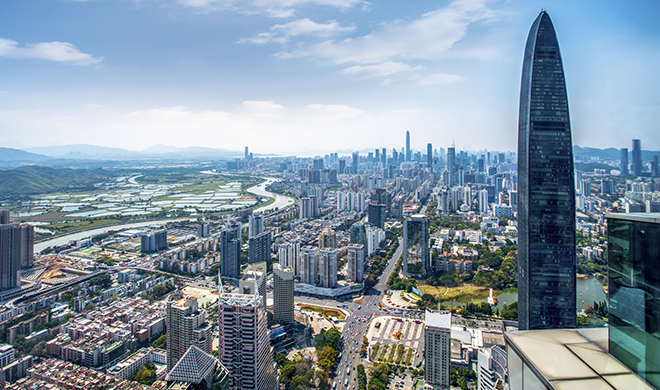
A survey “Understanding Hong Kong working adults’ aspiration for taking up residence in the Greater Bay Area cities”, conducted by the School of Graduate Studies of Lingnan University (LU), found that the psychological distance definitely reduces people’s intention to move to the Greater Bay Area (GBA). The research team noted an urgent need for policymakers to raise public awareness of the positive aspects of the GBA and its future development.
The research team commissioned international survey firm Dynata to draw a sample of young adults in Hong Kong between 25 March and 1 April 2019. A total of 1,028 Hong Kong residents aged between 18 and 35 from all 18 districts were invited to complete an online questionnaire concerning their attitudes and feelings towards GBA cities, including their experiences of visiting them and their intentions of moving there.
Respondents were divided into three income groups, based on their self-reported monthly incomes. Those with a monthly income of between HK$0 and HK$19,999 were classified as low-income earners; those between HK$20,000 and HK$29,999 were classified as middle-income earners; while those with a monthly income of or above HK$30,000 were classified as high-income earners. These were 41.9 per cent, 30.9 per cent, and 27.1 per cent, respectively.
Survey results show that over 60 per cent of the respondents indicated that they had visited GBA cities in the past 12 months (Figure 1). With regard to people’s concerns about moving to GBA cities, respondents were worried about low wages, internet restrictions and high tax rates in the GBA (Figure 2). However, the average scores for items “I am confident that cities in the GBA will be prosperous in the future” and “I am confident that the GBA will provide development opportunities for Hong Kong’s young people” were above 3 (out of 5). The highest scores were given by the high-income group (3.35 and 3.18, respectively) (Figure 3). Nonetheless, respondents took a relatively neutral position on whether they would consider moving to GBA cities to live and work with an average score of 2.5. Here the high-income group had the highest score (2.74) (Figure 4).
Prof Alex Zhu Yuefeng, Research Assistant Professor of the School of Graduate Studies, said that the survey results indicate a significant relationship between psychological distance and people’s perception of the GBA. “Psychological distance is composed of temporal, spatial and social distances. Uncertainty about the GBA’s future produces a sense of temporal distance; the border control between Mainland China and Hong Kong creates a sense of spatial distance, and the different institutional arrangements and lifestyles of the two regions lead to social distance, which inevitably reduces positivity and any intention to move to the GBA,” he explained.
He added that field visits to GBA cities could shorten spatial distance and help relieve concerns about Mainland society and governance, and, as a result, lessen social distance. “When people build a positive attitude towards the development of the GBA, this will help reduce temporal distance.”
Prof Joshua Mok Ka-ho, Vice-President of LU, who led the study, said that the rapid development of the GBA would generate many new opportunities for Hong Kong people. He urged policymakers to encourage people to work or move to GBA cities by eliminating the psychological distance. “The most important thing is to raise public awareness of the positive aspects of the GBA’s future and development, as this may minimise situational concerns and increase the likelihood of their visiting a GBA city, which may encourage them to move. We highly recommend field visits and face-to-face exchanges between high-income individuals in Hong Kong and GBA cities, as the high-income group was more interested in visiting the GBA.”
This survey will be published in the coming issue of the international academic journal Analyses of Social Issues and Public Policy.
Figure 1
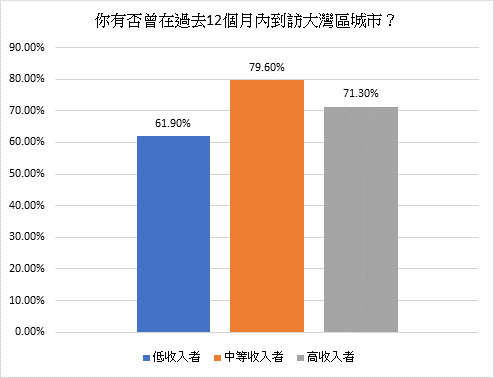
Figure 2
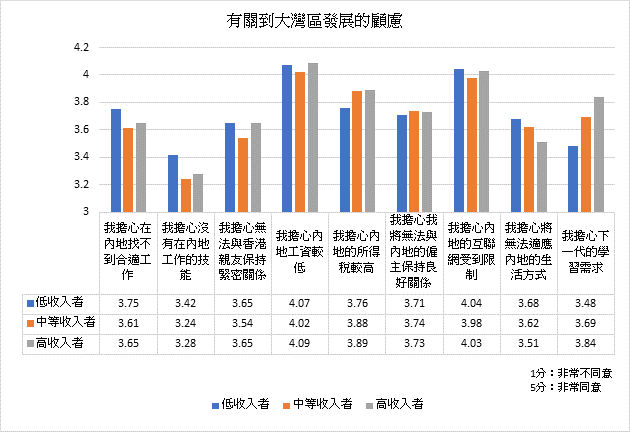
Figure 3
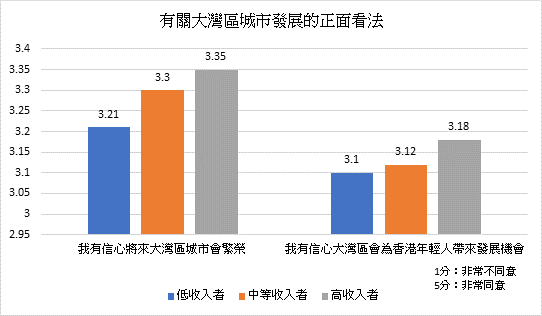
Figure 4
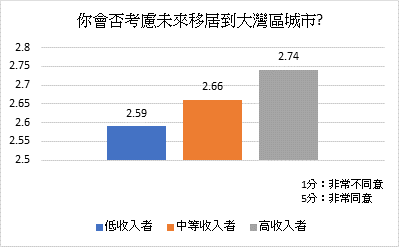
Media Report
- The Standard
- Sing Tao Daily (Chinese only)
- Hong Kong Economic Times (Chinese only, subscription required)
- Hong Kong Commercial Daily (I) (Chinese only)
- Hong Kong Commercial Daily (II) (Chinese only)
- Oriental Daily News (Chinese only)
- On.cc (Chinese only)
- HK01 (Chinese only)
- Sky Post (I) (Chinese only)
- Sky Post (II) (Chinese only)
- Bastille Post (Chinese only)
- TOPick (Chinese only)
- Sing Tao Canada (Chinese only)
- Sznews.com (Chinese only)
- Asia Research News
- Line Today News (Chinese only)
- News for Hong Kong (Chinese only)
- Phuket Times News
- Thailand Daily
- 6do News (Chinese only)
- Meet HK (Chinese only)
- Beijing-Hong Kong Academic Exchange Centre (Chinese only)



